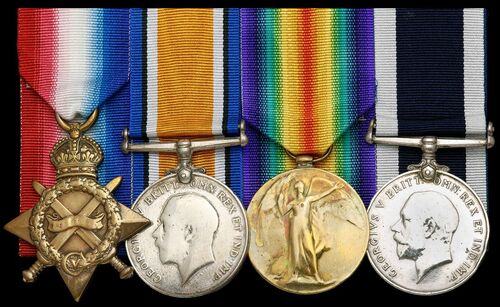
Auction: 23112 - Orders, Decorations and Medals - e-Auction
Lot: 453
Four: Sailmaker A. B. West, Royal Navy, who survived the sinking of H.M.S. Russell and then saw heavy fighting with Petard at Jutland
1914-15 Star (J.27141, A. W. West. Boy. 1., R.N.); British War and Victory Medals (J.27141 A. W. West. A.B. R.N.); Royal Navy L.S. & G.C., G.V.R. (J.27141 A. W. West. A.B. H.M.S. Pembroke.), the first three heavily polished, edge bruising, contact marks overall, nearly very fine (4)
Arthur William West was born at Edgeware, London on 28 April 1898 and enlisted with the Royal Navy on 10 September 1913 as Boy Class II.
The Mediterranean
Posted to the Battleship Russell with the 6th Battle Squadron as Boy Class I on the outbreak of the Great War he remained with her during the transfer to the Mediterranean in the build up to the Gallipoli Campaign. Here she was involved in the evacuation of troops from Cape Helles and later remained on in the Eastern Mediterranean. West reach maturity aboard the battleship, being appointed Ordinary Seaman on 20 April 1916.
Whilst underway just off Malta on 27 April Russell struck two sea mines laid by U-73. They did not cause her to sink immediately but a fire broke out in her after section. Despite efforts to control it an explosion near one of the 12-inch guns brought matters to a head and the vessel was evacuated with over 100 men dying in the disaster. West was amongst the survivors and after a brief interval he joined the crew of the destroyer Petard.
Jutland
With this vessel he saw action at Jutland where she formed part of the heavily engaged 13th Destroyer Flotilla. Part of Beatty's Battlecruiser fleet Petard was part of the destroyer screen ordered to launch a torpedo attack upon the enemy in the early hours of the Battle. They engaged the German escorts and a close quarters battle was fought between the fleets, both Nestor and Nomad were sunk in this clash.
Petard however made it through, striking the German destroyer V29 with a torpedo and battering her with 4-inch gunfire on the way past. She came upon the German Battlecruiser line and took again lined up her torpedoes:
'We fired another torpedo at about 9,000 yards range at the German Battlecruiser line and then turned to starboard to a slightly converging but nearly parallel course, to the German battle-cruisers. We steamed ahead a little and when about four points on their bow fired the remaining two torpedoes. By this time the German destroyers seemed to have disappeared.'
(Lt. Commander E. C. Thomson, as quoted in The Jutland Honours)
Despite not being aware of it one of Petard's torpedoes had in fact run on a good distance and hit Seydlitz causing serious damage. In fact when the battlecruiser returned to port her freeboard was reduced to only 2.5 meters and she had taken on 5,300 tons of water. On her return journey Petard was also to rescue one of the survivors of the battleship Queen Mary, one of only twenty to be saved.
During the night of 31 May-1 June she was one of the warships that became lost and crossed the German line, coming uner fire from Westfalen. She was hit four times as a result with nine killed and six wounded as a result of a hit upon one of her 4-inch guns.
Surviving the intense action at Jutland West remained with Petard until 1 October 1917 when he was posted to Verdun. He was to see postwar service with a number of warships including Cyclops, Colombo and Moorhen. Appointed Sailmaker's Mate on 14 October 1934 and Sailmaker on 1 February 1937 West was pensioned on 19 April 1938.
He returned to service for the Second World War, once again being appointed Sailmaker. Posted to the shore establishment Calliope on 16 May 1941 he was to serve there until being invalided from service on 7 August 1945; sold together with copied service papers.
Subject to 20% VAT on Buyer’s Premium. For more information please view Terms and Conditions for Buyers.
Sold for
£150
Starting price
£80




